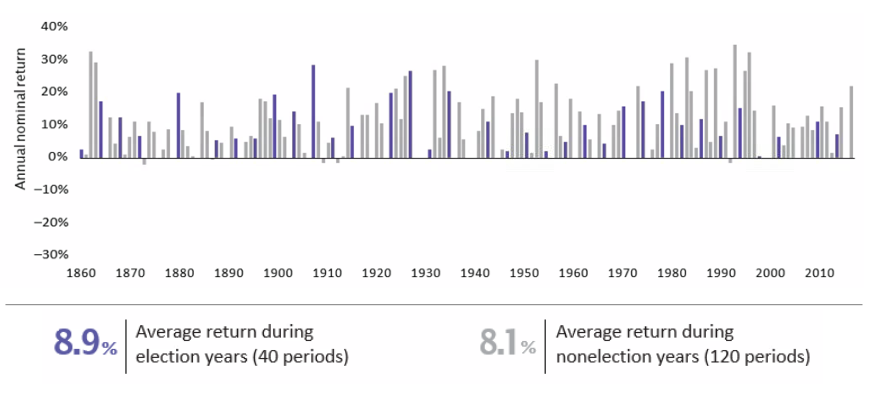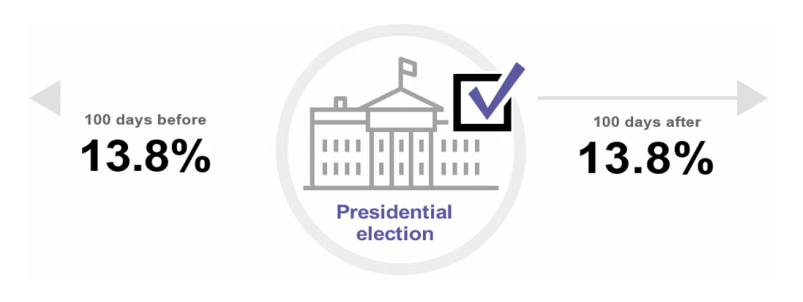Elections Matter, but Not so Much to Your Investments
Election years can be fraught with uncertainty as developments surrounding the candidates, their platforms, and their predicted effects on the economy and markets dominate the news. But should you let this stream of political information influence how you and Towneley manage your investment portfolio?
A lengthy history of empirical research suggests not.
Elections matter, just not in all the ways you might think to an investor. Of course, they hold great importance in upholding the U.S. tradition of democratic, representative government. However, their impact on market returns has historically proven to be negligible, as shown in the chart below.
Comparing elections years versus nonelection years: 60% stock/40% bond portfolio returns show no statistical difference.
Source: Vanguard calculations, based on data from Global Financial Data as of December 31, 2019. The 60% GFD US-100 Index and 40% GFD US Bond Index, as calculated by historical data provider Global Financial Data. The GFD US-100 Index includes the top 25 companies from 1825 to 1850, the top 50 companies from 1850 to 1900, and the top 100 companies by capitalization from 1900 to the present. In January of each year, the largest companies in the United States are ranked by capitalization, and the largest companies are chosen to be part of the index for that year. The next year, a new list is created and it is chain-linked to the previous year’s index. The index is capitalization-weighted, and both price and return indices are calculated. The GFD US Bond Index uses the U.S. government bond closest to a 10-year maturity without exceeding 10 years from 1786 until 1941 and the Federal Reserve’s 10-year constant maturity yield beginning in 1941. Each month, changes in the price of the underlying bond are calculated to determine any capital gain or loss. The index assumes a laddered portfolio that pays interest on a monthly basis.
Note: Past performance is no guarantee of future returns. The performance of an index is not an exact representation of any particular investment, as you cannot invest directly in an index.
Given the horse race nature of political campaigns, you may think that in the months closest to an election, there is a noticeable uptick in volatility. In actuality, the opposite has been true. From January 1, 1964, to December 31, 2019, the Standard & Poor’s 500 Index’s annualized volatility was 13.8% in the 100 days both before and after a presidential election, which was lower than the 15.7% annualized volatility for the full time period.
Volatility and the vote: Markets tend to ignore elections
S&P 500 Index annualized volatility
Full time period: 15.7%
Source: Vanguard calculations of S&P 500 Index daily return volatility from January 1, 1964, through December 31, 2019, based on data from Thomson Reuters.
Note: Past performance is no guarantee of future returns. The performance of an index is not an exact representation of any particular investment, as you cannot invest directly in an index.
The bottom line: Elections are another one of those events that generate lots of headlines but that should not necessitate a deviation from the investment strategies designed around your long-term objectives. Where your portfolio and the markets are concerned, history suggests the election will be a nonissue.
Notes:
All investing is subject to risk, including possible loss of principal. Be aware that fluctuations in the financial markets and other factors may cause declines in the value of your account. There is no guarantee that any particular asset allocation or mix of funds will meet your investment objectives or provide you with a given level of income.
Diversification does not ensure a profit or protect against a loss.
Investments in bonds are subject to interest rate, credit, and inflation risk.
Investment Products: Not a Deposit • Not FDIC Insured • Not Guaranteed by the Bank • May Lose Value • Not Insured by Any Federal Government Agency














